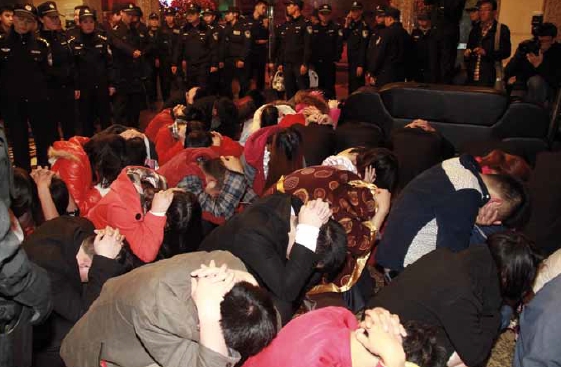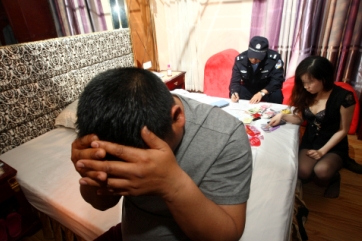| 
People in a hotel in Dongguan are caught involved in sex trade on February 9
A full-scale crackdown on prostitution swept over China in February. The operation, which began in Dongguan, a city in southChina’s Guangdong Province, known for its notorious sex service industry, came following an exposé by state broadcaster China Central Television (CCTV) in early February. An undercover journalist videotaped “beauty pageants” in Dongguan with a hidden-camera, featuring prostitutes and strippers in some of the city’s hotels and karaoke clubs.
This report elicited a strong and rapid response from officials and initiated a large-scale crackdown on prostitution. Just hours after the report was aired, the first of a series of raids were made in Dongguan. More than 6,000 police officers swept through hundreds of hotels, saunas and karaoke bars in the city on February 9, arresting at least 67 people, closing down 12 venues and suspending two police chiefs.
The Ministry of Public Security (MPS) followed up on demands to crack down on prostitution and pornography nationwide. As of February 21, police had captured 501 suspects, busted 73 prostitution-related gangs and suspended 2,410 venues providing sex services.
Long-term battle
Dongguan, which is located about 140 km from Hong Kong, has long been one of the primary manufacturing bases in the world. After reform and opening-up policies were initiated in the late 1970s, Dongguan experienced a rapid development from a small fishing village to a leading manufacturing city. In 2013, the gross domestic product of the city exceeded 500 billion yuan ($82.5 billion).
Yao Kang, a senior local official, revealed that one 10th of the world’s sneakers are produced in Dongguan, about 20 percent of the world wears Dongguan-made sweaters, and 30 percent of the world’s children are playing with Dongguan-made toys. World-famous brands, such as Nokia and Samsung, also have plants in the city.
After the latest prostitution crackdown, top leaders from four local townships in Dongguan - Humen, Houjie, Huangjiang and Fenggang - made open apologies on February 16. They admitted that there were loopholes in management policies and said that they will learn from this lesson and perform their duty in fighting crime to their fullest in the future.
Entertainment venues could only open with the approval of police authorities, until the approval procedures were dropped in 2002. “The government should ponder effective ways to eliminate the root cause of prostitution,” said Zhu Lijia, a professor at the Chinese Academy of Governance. “It is time to find solutions to the problem based on sound institutional arrangements.”
“Prostitution has been masked under legal cover in recent years, which has increased the difficulty of crackdowns,” said Chen Zhonglin, a law professor at Chongqing University. There have also been speculations that local police forces may be protecting the sex trade, which is alleged to stimulate consumption and create job opportunities.
On February 13, Yan Xiaokang, Vice Mayor of Dongguan and head of the city’s Public Security Bureau, was removed from his post for dereliction of duty. Local deputy police head Lu Weiqi and several other officials were also sacked.
On February 16, the MPS told police all over the country that it will severely punish those who are found guilty of misconduct and malpractice in prostitution crackdowns, as well as those who break laws while in charge of enforcement. “No matter who is involved, no matter how high their positions, all must be investigated to the end, with absolutely no tolerance,” said the ministry.

A policeman takes written declaration of two people caught engaging in sex trade in Guo’an Hotel in Dongguan City, Guangdong Province on February 9
Controversy
Prostitution has been outlawed inChinasince the People’s Republic ofChinawas founded in 1949. But the country’s sex trade has still gained ground in the past three decades.
The first case of prostitution that was officially recorded since the outlawing was in 1976 inHangzhou, capital of eastChina’s Zhejiang Province. In 1979, similar cases were reported inShanghaiandGuangzhou, capital of Guangdong. In 1980, the MPS instigated a large-scale prostitution crackdown. The first nationwide raid was launched in 1989, with similar operations having been conducted almost annually since then. In addition, more than 60 laws and regulations aimed at wiping out prostitution were promulgated between 1981 and 2007.
Statistics from the MPS showed that police apprehended 19,000 suspects and broke up 6,323 pornography-related gangs in 2013 alone, resulting in 12,000 cases being solved. “These deeds have shown the government’s firm stance against prostitution, which is a source of instability in society,” said Wang Hongjun, an official from People’s Public Security University of China. However, a number of social networking website users expressed sympathy for Dongguan’s prostitution industry after the recent crackdown, posting comments such as “Dongguan, hang in there!” and “Today we are all Dongguan people.”
Some argued that prostitution is based on “market demand” and is “beneficial,” and called for sex work to be legalized. “Such widespread online backlash against CCTV reflects the conflict between mainstream social values and negative thoughts,” said Liu Dongchao, a professor at the Chinese Academy of Governance.
On December 23, 2013, the General Office of the CPC Central Committee issued a detailed guideline on bolstering core socialist values to realize the Chinese dream of national renewal. According to the guideline, core socialist values include the national goals of prosperity, democracy, civility and harmony; the social goals of freedom, equality, justice and the rule of law; and the individual values of patriotism, dedication, integrity and friendship.
President Xi Jinping, on February 17, called for greater efforts to promote such values and set up a value system with Chinese characteristics in line with the modern era. The ongoing prostitution and pornography crackdown is considered to echo Xi’s call.
“Those who think prostitution and pornography are not newsworthy have been misled. Both the government and society need to realize the seriousness of the problem,” said Fang Jundong, Secretary of the Communist Youth League Committee of South China University of Technology inGuangzhou.
Social openness and freedom have increased over the past three decades, accompanied by excessive liberalism, which has harmed social morality, said Liu, with the Chinese Academy of Governance, referring to online “support” for those involved in the Dongguan scandal. |